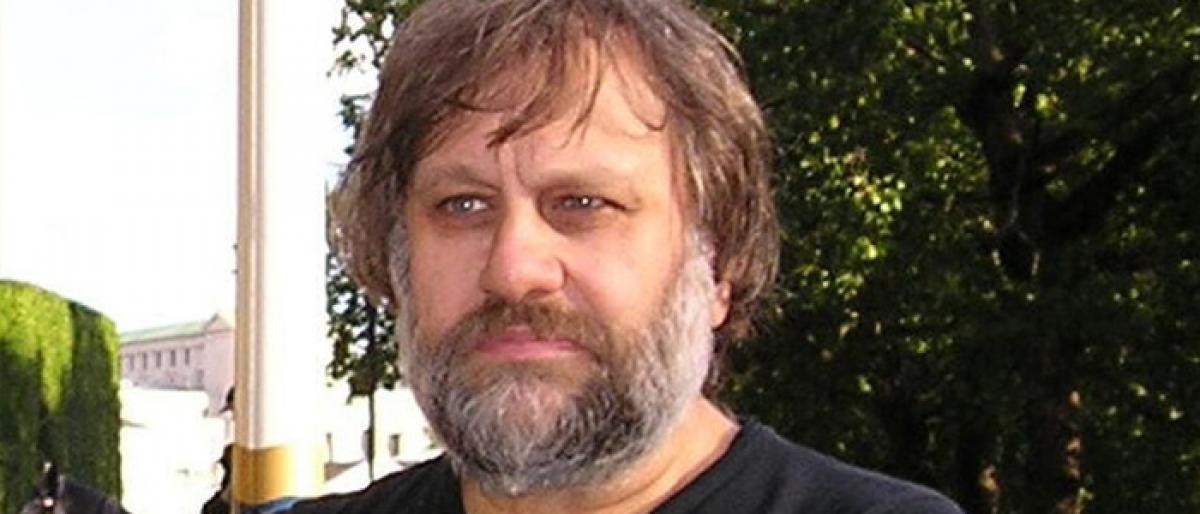Radical, rockstar philosopher and his dangerous ideas

Philosophers may be called \"dangerous\" for their ideas, can be flamboyantly idiosyncratic, but are rarely described as \"the superstar messiah\" of their ideology or \"Elvis\" of their field. But this Slovene qualifies – for combining two \"discredited\" systems of thought, being polemical and provocative in political and social criticism, but yet lucid in approach and also appearing onscreen to discuss
Philosophers may be called "dangerous" for their ideas, can be flamboyantly idiosyncratic, but are rarely described as "the superstar messiah" of their ideology or "Elvis" of their field. But this Slovene qualifies – for combining two "discredited" systems of thought, being polemical and provocative in political and social criticism, but yet lucid in approach and also appearing onscreen to discuss popular cinema, among other traits.
Among our time's most prominent and popular thinkers (a prolific writer translated into over 20 languages and much in demand for lectures), the bearded, burly Slavoj Zizek is most known for seeking to restore Marxism and psychoanalysis as viable systems and meld them together to offer a different view of our world.
His primary focus is on politics, which he also deals with through his eclectic "interests" – Hollywood films from Charlie Chaplin silent comedies to more contemporary box-office hits (the ‘Terminator’ series, ‘Matrix’), popular fiction (from Sir Arthur Conan Doyle to Stephen King), "high" literature (from Shakespeare to Kafka), and biogenetics, neuroscience and quantum physics.
But along with all this, he weighs in on problems of poverty, ecology, political repression and immigration, as well as contesting the view that we live in a post-ideological era, and the new order of globalisation, the end of history, or the war on terror are here for the long term. A foe of right wing and capitalism, he is no friend of liberalism or political correctness either.
Yet Zizek doesn't strike much of a chord in India beyond the few votaries of various trajectories of philosophical thought, particularly those fascinated with the Central European intellectual tradition. This was evident from an informal survey among a group of professionals with rather exceptional level of cultural and literary awareness.
So, what does Zizek stand for, and why does he evoke such strong reactions of admiration, or apprehension or aversion? It would virtually impossible to condense his entire system of thought here, so let’s concentrate on a few major points.
Born in Ljubljana, the capital of the then Yugoslav state of Slovenia in 1949, he grew up in the comparative freedom of the Titoist era, and was exposed to Western popular culture. As an undergraduate in the University of Ljubljana, he wasn't a very keen communist and frequently clashed with authorities, being more interested in (barely-approved) philosophical works, mostly French. While he devoted his master's thesis to them, he was made to add an appendix on how they differed from Marxist orthodoxy.
Failing to get a job, he ultimately joined the Communist Party in 1977, and was appointed to the varsity's Institute of Sociology and Philosophy – a post he still holds. Despite all, he remains a committed Marxist, but not oblivious to its Stalinist and Maoist variants. His Marxism is more of a recognition of its economic subtext, and capacity for "emancipatory politics", not "dreams of revolutions around the corner".
Zizek also drew on the theories of Sigmund Freud as re-interpreted by French psychoanalyst Jacques Lacan, as well as German idealism, especially GWF Hegel and the Cartesian concept of the subject.
But apart from the purely philosophy content, let's see some practical implications of his thought. However, one key element in the former is his idea of truth, where he opposes the liberal notion that it is relative.
Truth for him is not a metaphysical construct or a set of universal principles governing meaning, but "an understanding of the real power relations that control society" and the ideologies curbing social and political freedom.
On ecology, Zizek declares the present attitude – the spiritual idea of nature – as deeply conservative and sentimental, believing a balanced world, disturbed by humans, can be restored, instead of what is needed – a radical approach to fight the ruthless market forces actually responsible as well as the acquiescent politicians.
The same misguided sentimentality, he argues, curbs eradication of worldwide poverty, where charity and "ethical" products represent a pure cultural capitalism which offers redemption while performing a consumerist act, and forestalls hope of an anti-capitalistic alliance between socially-conscious liberals and the radical left.
On terror, Zizek dismisses "McWorld vs Jihad" – the perceived opposition between Western "liberalism" and Islamic "fundamentalism" – as an American geo-strategic ploy. He also holds the concept of "clash of civilisations" is not a matter of "us vs them" but of Western interests in global affairs.
There is similar treatment of other major issues of the day, including the immigrant influx into the West, where he is also at his provocative best.
Where can we get to know Zizek more? His over 100 books in English and Slovene (and other languages), range from rather impenetrable polemic theory, academic works, and accessible essay collections, leave alone hosts of articles for academic journals, newspapers from the catalogue of US casual wear chain Abercrombie and Fitch.
Recommended "general" books are ‘Living in the End Times’ (2010), ‘Refugees, Terror and Other Troubles with the Neighbours: Against the Double Blackmail’ (2016) and ‘The Courage of Hopelessness’ (2017).
If you want to know what some iconic Hollywood films really depict, check out his documentaries, ‘The Pervert's Guide to Cinema’ (2006) and its sequel ‘The Pervert's Guide to Ideology’ (2012).
Both options are rewarding.




















